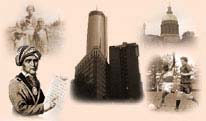Community Projects:
Bridges Contest ReflectionsWhy Build a Bridge?
by Bernadette LambertMost people are good people. That’s what my parents taught me, and I never doubted it as a child. I carried the philosophy with me when I left Catholic school and enrolled in the public high school where it took me several years to get over feeling different. I was like sixth grader Gabrielle Arrington, who wrote one of the wonderful pieces in this anthology. I, too, felt like an "alien . . . in a strange environment." But I didn’t stop believing that most people are good people, even as I journeyed to college. I was as determined as high school senior Melissa Morello (another of our authors) "to crack my hermit shell." So I joined a couple of organizations until a few students made sure to remind me that I was attending the University of Georgia and it was 1976. I wasn’t prepared for the racial slurs scrawled on my dormitory door, just as fourth-grader Ingrid Jiminez and fifth-grader Amy Li were not prepared for the taunts they received because they spoke a language other than English. Yet I kept that faith in the human spirit as I moved my children to a predominantly Caucasian area in Cobb County. My fifth grader was asked to write in the voice of a Civil War hero who believed "blacks were dumb and couldn’t be trusted." The words of second-grader Blake Huckaby best describe the situation. "It was sooooo sooooo sad." However, I did meet colleagues within the school system who were equally shocked, and changes were made. Like the mother of third-grader Ronke Olowojesiku, I had befriended several "Camki’s." They were the ones who were not afraid to stand up and shout, "It is not right." They were the good people my
parents spoke of. They allowed the happy ending to a sad story.
Seventh-grader Nhi Le begins her essay, "Her life was like a story . . . that happens to fictional characters." The truth is all of us have such a story, and sharing those stories validates what we have been feeling and what we have been through. As Grandpa in Walter Dean Myers’ "Jeremiah’s Song" explains it, when you have stories, "you got a bridge and a meaning. Then when things get so hard you about to break, you can sneak across that bridge and see some folks who went before you and see how they didn’t break. Some got twisted and a few fell along the way, but they didn’t break."
The student writers featured in the Bridges anthology have begun to build new bridges through their stories. Most of their words are not fancy, and many would never be displayed on the classroom walls of traditional teachers. But the teachers who selected these pieces are not traditional teachers. They are more of the good people my parents described. They hear the courageous voices of these students who have attempted to explain what it feels like to be new and often different. They are aware of the deeper meanings within the text. The teachers who selected these pieces know that kindergarten student Lateefat Alabi is right. "Love comes from the hurt."
A little love is exactly what we need right now as the results of the 2000 census show that between 1990 and 2000 the metro Atlanta area grew at a rate of 360 new people per day. The media suggest the numbers indicate more traffic and more pollution. However, educators know this growth means more students and more diversity. As this growth continues, it might benefit us all to keep in mind the thoughts of Val Jencks, a high school junior. "Whether you realize it or not, every single person you will ever see, or meet, or talk to, or touch, will affect you in negative and positive ways. You learn something from each person and from there you learn to live."
We invite you to learn much from the young voices featured in this anthology. Don’t look for places to make corrections; instead look for places to make connections. Escape from the spell check of your mind, and become captivated by the images created by student writers, some as young as six years old. The students at Sprayberry High School who published the anthology agreed to stay true to the writers’ words. For the power is in the words. Honoring students' efforts to learn language by using it and writing by doing it, the talented editors at Sprayberry kept corrections to a minimum, so you could read these stories in the authentic, not-always-perfect voices of their authors. The power is in the experiences. The power is within each of us as citizens of our greatest community — the world — to recognize that we must all become bridge builders. And we can do it! After all, most of us are good people.
© 2000-2001KCAC
No materials on this website should be copied or distributed
(except for classroom use) without written permissions from KCAC.
Questions? Comments? Contact KSU webmaster
Jim Cope.

